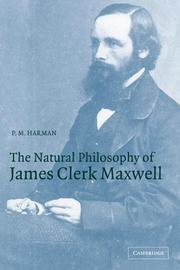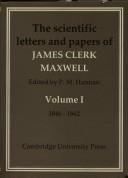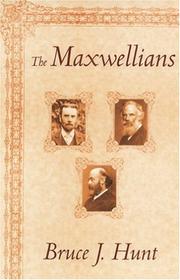| Listing 1 - 9 of 9 |
Sort by
|
Book
Year: 1923 Publisher: Cambridge : Cambridge university press,
Abstract | Keywords | Export | Availability | Bookmark
 Loading...
Loading...Choose an application
- Reference Manager
- EndNote
- RefWorks (Direct export to RefWorks)
Book
ISBN: 0191641251 9780191641251 9781306300544 1306300541 9780199664375 0199664374 019164126X Year: 2014 Publisher: Oxford: Oxford university press,
Abstract | Keywords | Export | Availability | Bookmark
 Loading...
Loading...Choose an application
- Reference Manager
- EndNote
- RefWorks (Direct export to RefWorks)
James Clerk Maxwell (1831-1879) had a relatively brief, but remarkable life, lived in his beloved rural home of Glenlair, and variously in Edinburgh, Aberdeen, London and Cambridge. His scholarship also ranged wide - covering all the major aspects of Victorian natural philosophy. He was one of the most important mathematical physicists of all time, coming only after Newton and Einstein.In scientific terms his immortality is enshrined in electromagnetism and Maxwell's equations, but as this book shows, there was much more to Maxwell than electromagnetism, both in terms of his science and his wi
Physicists --- Maxwell, James Clerk, --- Maksvell, Dzhems Klerk, --- Maxwell, J. Clerk --- Maxwell, J. C. --- Maxwell, Clerk, --- Maksvell, Dzheĭms Klerk, --- Electromagnetism --- Science --- History --- history --- Electromagnetism - History --- Science - history

ISBN: 0521561027 Year: 1998 Publisher: Cambridge, UK ; New York : Cambridge University Press,
Abstract | Keywords | Export | Availability | Bookmark
 Loading...
Loading...Choose an application
- Reference Manager
- EndNote
- RefWorks (Direct export to RefWorks)
Physics --- History --- Maxwell, James Clerk, --- -Natural philosophy --- Philosophy, Natural --- Physical sciences --- Dynamics --- -Maxwell, James Clerk --- -History --- Natural philosophy --- Maksvell, Dzhems Klerk, --- Maxwell, J. Clerk --- Maxwell, J. C. --- Maxwell, Clerk, --- Maksvell, Dzheĭms Klerk,
Book
ISBN: 0862280265 Year: 1983 Publisher: Edinburgh
Abstract | Keywords | Export | Availability | Bookmark
 Loading...
Loading...Choose an application
- Reference Manager
- EndNote
- RefWorks (Direct export to RefWorks)
Maxwell, James Clerk --- 929 --- Physicists --- -Physical scientists --- Biografie. Genealogie. Heraldiek --- Biography --- -Biografie. Genealogie. Heraldiek --- 929 Biografie. Genealogie. Heraldiek --- -929 Biografie. Genealogie. Heraldiek --- 929 Biography. Genealogy. Heraldry --- Biography. Genealogy. Heraldry --- Maxwell, James Clerk, --- Maksvell, Dzhems Klerk, --- Maxwell, J. Clerk --- Maxwell, J. C. --- Maxwell, Clerk, --- Maksvell, Dzheĭms Klerk,

ISBN: 0521256259 9780521256254 0521256267 9780521256261 0521256275 9780521256278 9780521746144 0521746140 9780521746175 0521746175 Year: 1990 Publisher: Cambridge [England] New York Cambridge University Press
Abstract | Keywords | Export | Availability | Bookmark
 Loading...
Loading...Choose an application
- Reference Manager
- EndNote
- RefWorks (Direct export to RefWorks)
Molecular theory --- Statistical methods --- Electromagnetic theory. --- Light, Wave theory of. --- Molecular theory - Statistical methods. --- 33.00 physics: general. --- 33.01 history of physics. --- Elektromagnetisme. --- Licht. --- Lumière, Théorie ondulatoire de la. --- Molecuulfysica. --- Physicists --- Physics --- Théorie moléculaire x Méthodes statistiques. --- Théorie électromagnétique --- Wave theory of light. --- Statistical methods. --- History --- Histoire --- Sources. --- Maxwell, J. Clerk , --- Maxwell, James Clerk,
Book
ISBN: 9781107019683 9781107424326 9781139095167 1107019680 9781107019638 110701963X 1139095161 9781139569118 1139569112 9781139572675 1139572679 6613951137 9786613951137 1283638673 9781283638678 1139888757 9781139888752 1139579495 9781139579490 1139573462 9781139573467 1139570927 9781139570923 1139570013 9781139570015 1107424321 Year: 2012 Publisher: Cambridge: Cambridge university press,
Abstract | Keywords | Export | Availability | Bookmark
 Loading...
Loading...Choose an application
- Reference Manager
- EndNote
- RefWorks (Direct export to RefWorks)
Time asymmetric phenomena are successfully predicted by statistical mechanics. Yet the foundations of this theory are surprisingly shaky. Its explanation for the ease of mixing milk with coffee is incomplete, and even implies that un-mixing them should be just as easy. In this book the authors develop a new conceptual foundation for statistical mechanics that addresses this difficulty. Explaining the notions of macrostates, probability, measurement, memory, and the arrow of time in statistical mechanics, they reach the startling conclusion that Maxwell's Demon, the famous perpetuum mobile, is consistent with the fundamental physical laws. Mathematical treatments are avoided where possible, and instead the authors use novel diagrams to illustrate the text. This is a fascinating book for graduate students and researchers interested in the foundations and philosophy of physics.
Maxwell's demon --- Second law of thermodynamics --- Statistical thermodynamics --- Maxwell, James Clerk, --- Maxwell, James Clerk --- Statistical mechanics --- Second law of thermodynamics. --- Statistical thermodynamics. --- Maxwell, Démon de --- Mécanique statistique --- Deuxième principe de la thermodynamique --- Thermodynamique statistique --- Maxwell's demon. --- Demon of Maxwell --- Maxwell demon --- Thermodynamics --- Quantum theory --- Statistical physics --- 2nd law of thermodynamics --- Laws of thermodynamics --- Maksvell, Dzhems Klerk, --- Maxwell, J. Clerk --- Maxwell, J. C. --- Maxwell, Clerk, --- Maksvell, Dzheĭms Klerk, --- Physics --- General and Others --- Maxwell, James Clerk, - 1831-1879
Book
ISBN: 3319185152 3319185144 Year: 2015 Publisher: Cham : Springer International Publishing : Imprint: Springer,
Abstract | Keywords | Export | Availability | Bookmark
 Loading...
Loading...Choose an application
- Reference Manager
- EndNote
- RefWorks (Direct export to RefWorks)
In this volume Pierre Duhem first gives an overview of 19th century electricity and magnetism. Next, he applies his keen historical, philosophical, and physical intuition to critiquing Maxwell’s theories, especially his electromagnetic theory of light and the ad hoc introduction of displacement current, which he considers too much a product of the “esprit de géométrie” than the “esprit de finesse,” as Pascal calls it. In this book, Duhem is guided by the principle that a theory that offers contradictions, even if the theory is posed by a genius, needs to be analysed and discussed until a clear distinction can be made between the propositions likely to be logically demonstrated and statements that offend logic and which must be transformed or rejected. Furthermore, Duhem felt, in criticizing such a theory one must guard against narrowness of mind and petty corrections which would make one forget the merit of the inventor; and, more importantly, one must guard against the blind superstition which, for admiration of the author, would hide the serious defects of the work. He is not so great a genius that he surpasses the laws of reason. Pierre Duhem (1861-1916), chairman of theoretical physics at Bordeaux in 1984-1916, is well-known for his works in the history and philosophy of science.
History. --- Science --- History of Science. --- History and Philosophical Foundations of Physics. --- Philosophy of Science. --- Normal science --- Philosophy of science --- Annals --- Auxiliary sciences of history --- Philosophy. --- Electricity --- Dielectrics. --- Electromagnetic theory. --- Maxwell, James Clerk, --- Light, Electromagnetic theory of --- Electric fields --- Magnetic fields --- Electrical engineering --- Electric insulators and insulation --- Materials --- Maksvell, Dzhems Klerk, --- Maxwell, J. Clerk --- Maxwell, J. C. --- Maxwell, Clerk, --- Maksvell, Dzheĭms Klerk, --- Physics. --- Philosophy and science. --- Science and philosophy --- Natural philosophy --- Philosophy, Natural --- Physical sciences --- Dynamics
Book
ISBN: 022616490X 9780226164908 9780226164878 022642233X Year: 2015 Publisher: Chicago ; London University of Chicago Press
Abstract | Keywords | Export | Availability | Bookmark
 Loading...
Loading...Choose an application
- Reference Manager
- EndNote
- RefWorks (Direct export to RefWorks)
During the Victorian period, the practice of science shifted from a religious context to a naturalistic one. It is generally assumed that this shift occurred because naturalistic science was distinct from and superior to theistic science. Yet as Huxley's Church and Maxwell's Demon reveals, most of the methodological values underlying scientific practice were virtually identical for the theists and the naturalists: each agreed on the importance of the uniformity of natural laws, the use of hypothesis and theory, the moral value of science, and intellectual freedom. But if scientific naturalism did not rise to dominance because of its methodological superiority, then how did it triumph? Matthew Stanley explores the overlap and shift between theistic and naturalistic science through a parallel study of two major scientific figures: James Clerk Maxwell, a devout Christian physicist, and Thomas Henry Huxley, the iconoclast biologist who coined the word agnostic. Both were deeply engaged in the methodological, institutional, and political issues that were crucial to the theistic-naturalistic transformation. What Stanley's analysis of these figures reveals is that the scientific naturalists executed a number of strategies over a generation to gain control of the institutions of scientific education and to reimagine the history of their discipline. Rather than a sudden revolution, the similarity between theistic and naturalistic science allowed for a relatively smooth transition in practice from the old guard to the new.
Science --- Physicists --- Physical scientists --- History --- Maxwell, James Clerk, --- Huxley, Thomas Henry, --- 赫胥黎 --- Maksvell, Dzhems Klerk, --- Maxwell, J. Clerk --- Maxwell, J. C. --- Maxwell, Clerk, --- Maksvell, Dzheĭms Klerk, --- science, religion, victorian, history, naturalism, natural laws, theory, hypothesis, scientific method, intellectual freedom, james clerk maxwell, christianity, agnosticism, thomas henry huxley, physicists, england, working mens college, education, free will, class, nonfiction, theism, secularism, creation, evolution, nature, knowledge, investigation, methodology, environmentalism, biography, scientists.

ISBN: 0801482348 9780801482342 0801426413 1501703277 Year: 1991 Publisher: Ithaca, N.Y. London Cornell University Press
Abstract | Keywords | Export | Availability | Bookmark
 Loading...
Loading...Choose an application
- Reference Manager
- EndNote
- RefWorks (Direct export to RefWorks)
James Clerk Maxwell published the Treatise on Electricity and Magnetism in 1873. At his death, six years later, his theory of the electromagnetic field was neither well understood nor widely accepted. By the mid-1890s, however, it was regarded as one of the most fundamental and fruitful of all physical theories. Bruce J. Hunt examines the joint work of a group of young British physicists-G. F. FitzGerald, Oliver Heaviside, and Oliver Lodge-along with a key German contributor, Heinrich Hertz. It was these "Maxwellians" who transformed the fertile but half-finished ideas presented in the Treatise into the concise and powerful system now known as "Maxwell's theory."
Electromagnetic theory --- Physics --- Physicists --- Natural philosophy --- Philosophy, Natural --- Physical sciences --- Dynamics --- Light, Electromagnetic theory of --- Electric fields --- Magnetic fields --- History. --- Maxwell, James Clerk, --- Lodge, Oliver, --- Heaviside, Oliver, --- Khevisaĭd, Oliver, --- Maksvell, Dzhems Klerk, --- Maxwell, J. Clerk --- Maxwell, J. C. --- Maxwell, Clerk, --- Maksvell, Dzheĭms Klerk, --- Fitzgerald, George Francis, --- Physiciens --- History --- Biography --- Biographie --- Great Britain --- Electromagnetic theory - History. --- Physics - Great Britain - History. --- Maxwell, James Clerk, 1831.1879. --- Fitzgerald, George Francis, 1851-1901. --- Lodge, Oliver, Sir, 1851-1940. --- Heaviside, Oliver, 1850-1925. --- Physicists - Great Britain - Biography. --- Rezeption --- Maxwellsche Theorie --- Entwicklung --- Elektromagnetische Welle --- Physics. --- Physicists. --- Electromagnetic theory. --- Physical scientists --- Fitzgerald, George Francis. --- Heaviside, Oliver. --- Lodge, Oliver. --- Maxwell, James Clerk --- Lodge, Oliver --- Hertz, Heinrich --- Heaviside, Oliver --- Fitzgerald, George Francis --- Great Britain. --- Elektrische Welle --- Welle --- Elektromagnetisches Feld --- Ursprung --- Entwicklungsstadium --- Fortschritt --- Entstehung --- Evolution --- Feldtheorie --- Maxwell-Theorie --- Elektrodynamik --- Elektromagnetismus --- Maxwellsche Gleichungen --- Fortwirken --- Nachwirkung --- Nachleben --- Wirkungsgeschichte --- Aneignung --- Auswirkung --- Fortleben --- Fitzgerald, G. F. --- Lodge, Oliver Joseph, --- Fitzgerald, George F. --- FitzGerald, George Francis --- Physiker --- 1851-1901 --- Elektriker --- 1850-1925 --- Hertz, H. --- Hertz, Henricus Rudolphus --- Hertz, Heinrich Rudolf --- Hertz, Heinrich R. --- Hertz, Heinrich Rudolph --- Hochschullehrer --- Wissenschaftler --- Hamburg --- Bonn --- Kiel --- Karlsruhe --- Christian-Albrechts-Universität zu Kiel --- Hertz, Elisabeth --- Hertz, Johanna --- Hertz, Mathilde --- Amman, Julius --- 22.02.1857-01.01.1894 --- 1857-1894 --- Lodge, Oliver J. --- Lodge, Oliver Joseph --- Prof. --- Sir --- Liverpool --- 1851-1940 --- Maxwell, James C. --- Clerk Maxwell, James --- Makswell, Džems Klerk --- Maxwell, James Clark --- Maxwell, Clerk --- Maxwell, J.C. --- Maxwell, C. --- Naturphilosophie, Moralphilosophie, mentale Philosophie; Mathematik --- Professor --- Edinburgh --- Cambridge --- Aberdeen --- London --- University of Aberdeen --- University of London --- University of Cambridge --- Clerk Maxwell --- 13.06.1831-05.11.1879 --- 1831-1879 --- Anglia --- Angliyah --- Briṭanyah --- England and Wales --- Förenade kungariket --- Grã-Bretanha --- Grande-Bretagne --- Grossbritannien --- Igirisu --- Iso-Britannia --- Marea Britanie --- Nagy-Britannia --- Prydain Fawr --- Royaume-Uni --- Saharātchaʻānāčhak --- Storbritannien --- United Kingdom --- United Kingdom of Great Britain and Ireland --- United Kingdom of Great Britain and Northern Ireland --- Velikobritanii͡ --- Wielka Brytania --- Yhdistynyt kuningaskunta --- Northern Ireland --- Scotland --- Wales
| Listing 1 - 9 of 9 |
Sort by
|

 Search
Search Feedback
Feedback About UniCat
About UniCat  Help
Help News
News